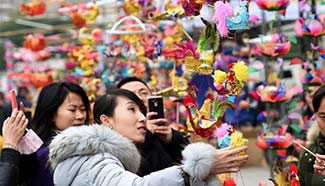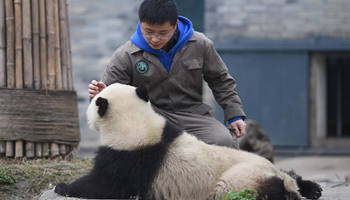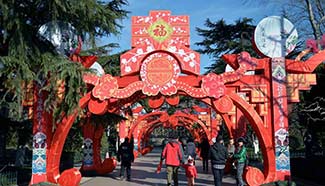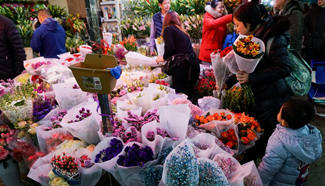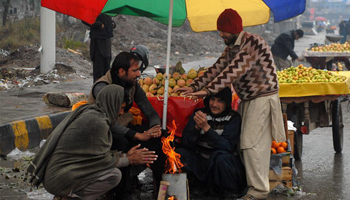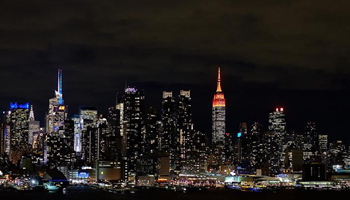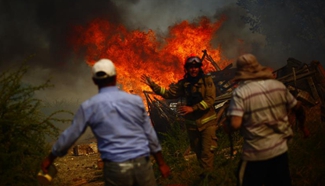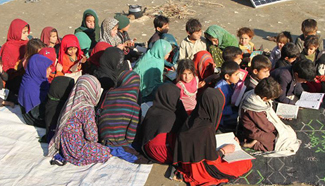BEIJING, Jan. 27 (Xinhua) -- While millions of Chinese are scrambling for a ticket home to catch the eve of Spring Festival, China's Lunar New Year, Wei Xudong, who boarded his train home on Tuesday, is bound to miss the important moment.
The train he is taking, K4 from Moscow to Beijing, will travel across a distance of more than 7,600 km and take more than five days to arrive.
Wei works on the train. The K3/4 train, began running between Beijing and Moscow in 1960, is the first and longest international rail managed by China's railway authorities.
For 57 years, the train has traversed the Eurasian continent on a weekly basis.
Wei joined China's railway system in 2008 to work on the high-altitude Qinghai-Tibet railway. It never occurred to him that six years later, he would be working on an even more legendary route.
"I can't recall how many times I have missed the Lunar New Year and been apart from my family," Wei said.
NEW YEAR ON EURASIAN ROUTE
Ma Yongsheng visited his daughter in Europe and they decided to travel back to China by train from Moscow. They arrived in Beijing on Monday.
"The train itself is a bit old, but the service surpasses that of European trains," said Ma.
Boarding the K4 alongside Ma in Moscow were Kevin Puzicha and Joscha Krieglsteiner from Hamburg, Germany. Both were traveling to Beijing for the first time.
"I want to experience Spring Festival first-hand," said Puzicha.
"The whole trip was great, and the crew treated us very well," he said, adding that he felt the warmth of the Chinese festival as soon as he boarded K4 at the other end of the Eurasia continent.
"Two days ago, the crew invited us to taste Chinese dumplings that they had made," Krieglsteiner said. "They were quite tasty."
The two German passengers plan to proceed to Shenzhen and then to Hong Kong, where they will watch the New Year parade.
Both homecoming and travelling passengers are not strange for Sun Guoxiang, head of the train crew, who has been working for Train K3/4 for almost 32 years.
"I feel honored to represent China on this international railway route," said Sun, reflecting upon the time when he joined the crew. Sun is now the longest-serving Chinese crew member.
"Spring Festival is the most important Chinese holiday. To be honest, I miss home a lot," he continued, adding that the sacrifices the railway workers make allow tens of thousands of households to enjoy the festival.
In celebration of Spring Festival, Sun and his colleagues have posted the character "fu," which means fortune and happiness, onto the doors and windows of the train alongside other paper-cuts, an established Chinese tradition.
On the eve of Chinese New Year, Sun and his colleagues will make Chinese dumplings and share them with the passengers.
"Many foreigners join us in making the dumplings. We have a translator who explains everything to them," said Sun. "They enjoy it."
Over the years, Russia's railway workers and border control officers have come to understand what Spring Festival means to Chinese, Sun said. "During the festival season they extend greetings to us Chinese crew, and we send them warm wishes on Christmas and Easter as well."
COLD JOURNEY, WARM HEART
The journey between Beijing and Moscow offers passengers spectacular views of the vast Gobi Desert, grasslands with clear creeks, Lake Baikal and boundless forests. These picturesque sights are famous among tourists around the globe.
For Puzicha, working on the K3/4 train seems to be "a cool job."
Cool it may be, but the job can also be trying.
For instance, as long portions of the route are through frigid landscapes, the train needs to be heated for as much as eight months of the year.
During winter, the temperature in Russia regularly dips to below negative 30 degrees Celsius. In order to ensure the comfort of the passengers, a trans-Eurasia trip requires five tons of coal for each carriage -- and all of that coal has to be shoved into the stove by two crew members.
A shift typically lasts for eight hours, and five hours of that shift may be occupied with shoveling, Sun said.
"Their hands and faces are filthy by the end of their shifts," Wei said.
For 57 years, Train K3/4 has marched onward, undaunted by wind or snow. Its total mileage amounts to 1,250 trips around the Earth's circumference. It has served 1.5 million passengers from over 100 countries.
Every Monday over the last 18 years, Gao Jun, deputy head of the Beijing Passenger Transport Department of the Beijing Railway Bureau, walks onto the platform of the Beijing Railway Station, waiting to meet his colleagues and passengers who have just finished the long journey.h In 1982, Gao joined the railway authority, and he was chosen to work as an attendant on Train K3/4 in 1985.
Gao left his position as the crew chief in 1999, but still walks across the street to Beijing Railway Station to welcome his colleagues when the train rolls into town.
"I feel so attached to the train," said Gao, fully uniformed. "Beijing, Siberia and Moscow dominate my memories of younger years."




